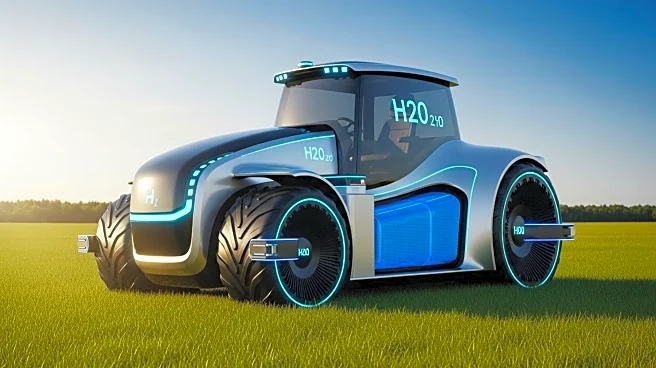What's Happening?
Kubota has introduced a prototype of an autonomous hydrogen-powered tractor at the Hydrogen Energy Park exhibition during Expo 2025 Osaka. The tractor uses a solid-polymer fuel cell to convert compressed hydrogen into electricity, producing only water vapor and heat as byproducts. It delivers power equivalent to a 100-horsepower diesel engine and can operate for up to 12 hours on a single refill. The autonomous capabilities allow the tractor to navigate fields, avoid obstacles, and perform tasks such as tillage and cultivation without an operator. This innovation addresses agriculture's challenges of labor shortages and decarbonization.
Why It's Important?
Kubota's hydrogen tractor represents a significant step towards emission-free and autonomous farming, offering a sustainable solution to the agricultural sector's environmental impact. Hydrogen fuel cells provide higher energy density than batteries, making them suitable for large machinery that requires long operational hours. The tractor's autonomous features can alleviate labor shortages by reducing the need for human intervention in farming operations. This development aligns with global efforts to reduce carbon emissions and promote sustainable agricultural practices.
What's Next?
Demonstration tests of the hydrogen tractor will be conducted on Japanese farms to evaluate its autonomous navigation capabilities, hydrogen supply logistics, and overall suitability for commercial farming. Kubota's broader autonomy strategy includes integrating autonomous features into existing diesel tractors and developing retrofit kits for partial automation. The success of these tests could lead to wider adoption of hydrogen-powered machinery in agriculture, further advancing the industry's sustainability goals.
Beyond the Headlines
The introduction of hydrogen-powered tractors has the potential to transform the agricultural industry by reducing its carbon footprint and addressing labor shortages. As hydrogen fuel technology becomes more accessible, it could lead to a shift in farming practices, promoting cleaner and more efficient operations. Additionally, the integration of autonomous technology in agriculture could enhance productivity and reduce costs, providing economic benefits to farmers and stakeholders.









